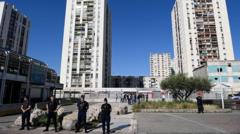Authorities in French cities are taking drastic measures to address a surge in drug-related violence that has left communities in fear. Recently, Nîmes has joined a growing list of cities enforcing nighttime curfews for children under the age of 16, aimed at shielding minors from exposure to violence associated with drug trafficking.
This comes on the heels of alarming incidents, including multiple daylight shootings and the discovery of a partially burned 19-year-old body on the outskirts of Nîmes. Mayor Jean-Paul Fournier described the current situation as "untenable," emphasizing that drug traffickers have instigated a "climate of fear and terror" necessitating immediate intervention. The curfew, effective from 21:00 to 06:00, is designed to protect not only those youths uninvolved in illegal activities but also younger children who may be vulnerable to exploitation by drug gangs.
Béziers, located approximately 120 kilometers southwest of Nîmes, has previously enacted a curfew for children under 13 and expanded it to include minors under 15 in select areas, yet violence lingers. Mayor Robert Ménard noted that unrestricted young individuals late at night are often merely engaging in mischief, but recent disturbances highlight the ongoing issues, as seen when youths attacked police officers with fireworks.
In Limoges, a curfew for under-13s was similarly implemented but described by Mayor Émile Roger Lombertie as ineffective in abating violence, prompting calls for a stronger police presence to enforce such measures. This turmoil in Nîmes recalls previous tragedies, including the 2021 death of a 10-year-old boy from a stray bullet, underscoring the urgent need for solutions.
This uptick in drug-related violence is not confined to Nîmes but reflects a broader unrest, extending beyond Marseille—historically the hub of gang activity in France. The country's interior ministry reported that 110 individuals lost their lives and over 300 were injured in drug-related incidents in 2024 alone.
French officials, including Interior Minister Gérard Darmanin, emphasize the necessity of addressing the drug trade's impacts. Following the government-enacted bill earlier this year designed to strengthen enforcement, two maximum-security prisons have been allocated for high-risk drug offenders, alongside additional powers for law enforcement and protections for informants in an attempt to disrupt these criminal networks.
As France finds itself embroiled in a violent confrontation with drug syndicates, the call for comprehensive strategies to mitigate the influence of such groups has never been more pronounced. The alarming frequency of violence sparks discussions about the best paths forward toward a safer, drug-free environment for children and communities alike.














